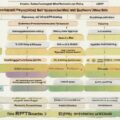In our daily lives, we often encounter two predominant outlooks: pessimism and optimism. These perspectives can significantly influence our behavior, decisions, and overall well-being. This article will delve into the distinctions between pessimism and optimism, their psychological underpinnings, and how they impact our lives.
What is Pessimism?
Pessimism is a tendency to see the worst aspect of things or believe that the worst will happen. A pessimistic individual generally lacks hope and confidence in the future. Pessimists are more likely to focus on the negative outcomes and often expect unfavorable results.
What is Optimism?
Optimism, on the other hand, is characterized by a positive outlook on life. Optimists expect good things to happen and believe that things will turn out well. They tend to focus on the positive aspects of a situation and have confidence in the future.
Psychological Impact of Pessimism and Optimism
The psychological impact of these two outlooks cannot be overstated. Studies have shown that optimism can lead to better health, longer life expectancy, and increased success in various domains of life. Pessimists might be more realistic at times, but they are also more prone to depression and negative health outcomes.
Can Pessimism and Optimism Be Changed?
While some people might be naturally more optimistic or pessimistic, it is possible to shift one’s outlook. Cognitive-behavioral therapy and mindfulness practices are among the techniques used to help individuals develop a more optimistic view of life.
Balance: The Key to a Healthy Outlook
Finding a balance between pessimism and optimism is crucial. Being overly optimistic can sometimes lead to disappointment, while being too pessimistic can prevent taking necessary risks. Embracing a realistic yet hopeful outlook is often the healthiest approach.
FAQ About Pessimism and Optimism
Q: Is optimism always better than pessimism?
A: Not necessarily. While optimism is often associated with positive outcomes, being realistic is important. A balanced outlook that incorporates both optimism and realism is generally the best.
Q: Can a pessimistic person become optimistic?
A: Yes, with effort and the right strategies, such as cognitive-behavioral techniques or mindfulness, one can develop a more optimistic outlook.
Q: Are there risks to being overly optimistic?
A: Yes, excessive optimism can lead to underestimating risks and potential negative outcomes, which might result in poor decision-making.
Q: How does optimism affect health?
A: Optimism has been linked to a range of health benefits, including lower stress levels, better immune function, and a lower risk of chronic diseases.
Q: What’s a good way to start developing a more optimistic outlook?
A: One way to develop a more optimistic outlook is to practice gratitude, focus on positive experiences, and challenge negative thought patterns.









